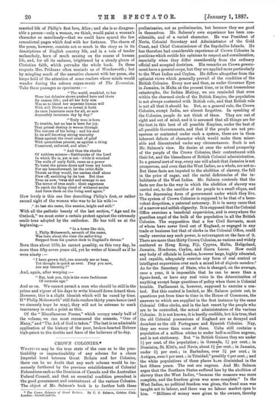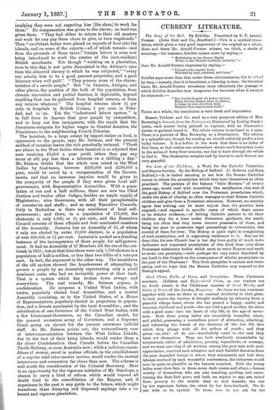CROWN COLONIES"
WHATEVER may be the true state of the case as to the prac- ticability or impracticability of any scheme for a closer Imperial bond between Great Britain and her Colonies, there can be no doubt that any such scheme would be im- mensely furthered by the previous establishment of Colonial Federations such as the Dominion of Canada and the Australian Federal Council, and that an essential condition precedent is the good government and contentment of the various Colonies. The object of Mr. Salmon's book is to farther both these • The Crown Colonies of Great Britain. By C. B. Salmon, Cobden Club. London : Omen and Co. preliminaries, not as preliminaries, but because they are good in themselves. Mr. Salmon's own experience has been con- siderable, and of a varied character. He was President of Nevis, Colonial Secretary and Administrator of the Gold Coast, and Chief Commissioner of the Seychelles Islands. He has therefore had considerable experience of Crown Colonies in positions which entitle his opinions to respect and consideration, especially when they differ considerably from the ordinary official and accepted doctrines. His remarks on Crown govern- ment have a general scope, but they are applied more particularly to the West Indies and Ceylon. He differs altogether from the optimist views which generally prevail of the condition of the British Colonies. Every now and then, as under Governor Eyre in Jamaica, in Malta at the present time, or in that tremendous catastrophe, the Indian Mutiny, we are reminded that even within the charmed circle of the British Empire, the population is not always contented with British rule, and that British rale is not all that it should be. But, as a general rule, the Crown Colonies, except India, are almost forgotten. In speaking of the Colonies, people do not think of them. They are out of sight and out of mind, and it is assumed that all things are for the best in this best of all possible Empires, under the best of all possible Governments, and that if the people are not pro- sperous or contented under such a system, there are in them inherent defects of character which would make them miser- able and discontented under any circumstances. Such is not Mr. Salmon's view. He denies at once the actual prosperity of the people of the Crown Colonies, their contentment with their lot, and the blessedness of British Colonial administration. In a general sort of way, every one will admit that Jamaica is not prosperous, and even that the West Indies, as a whole, are not so. But these facts are imputed to the abolition of slavery, the fall in the price of sugar, and the racial deficiencies of the in- habitants of the West Indies. Mr. Salmon contends that the facts are due to the way in which the abolition of slavery was carried out, to the sacrifice of the people to a small clique, and to the depressing form of government under which they live. The system of Crown Colonies is supposed to be that of a bene- volent despotism, a paternal autocracy. It is in many cases that of a narrow and selfish oligarchy. It is supposed that the Colonial Office exercises a beneficial supervision, and is everywhere the guardian angel of the bulk of the population in all the British Colonies. The supposition that a few Civil Servants, most of whom have never lived out of England, or engaged in any trade or business but that of clerks in the Colonial Office, could really exercise any such power, is extravagant on the face of it. There are more than thirty Crown Colonies, as various and widely scattered as Hong Kong, Fiji, Cyprus, Malta, Heligoland, Jamaica, Honduras, Ceylon, and Sierra Leone. How could. any body of officials in London, however large, highly educated, and capable, adequately exercise any form of real control or intelligent supervision over such a mixed lot of disjecia membra? As for the Secretary of State, who is changed, on the average, once a year, it is impossible that he can be more than a figure-head, or have any real voice in the determination of anything except large questions of policy when there is Colonial trouble. Parliament is, however, supposed to exercise a con- trol. But this control is limited, as Mr. Salmon points out, to questions put from time to time in the House of Commons, the answers to which are supplied in the first instance by the same Colonial Office clerks, and in the last resort by the people who are to be controlled, the actual administrators of the various Colonies. It is not known, it is hardly credible, but it is true, that the old Colonial possessions of England are as decayed and decadent as the old Portuguese and Spanish Colonies. Nay, they are worse than some of these. Cuba still contains a population of a million whites to under half-a-million negroes, and is not stationary. But " in British Guiana they are under 11 per cent. of the population ; in Grenada, 11 per cent. ; in Dominica, St. Kitt's, and Nevis, about 1+ per cent. ; in Jamaica, under 2+ per cent.; in Barbadoes, over 3+ per cent. ; in Antigua, over 5 per cent. ; in Trinidad," possibly 6 per cent. ; and the white populations of these places have diminished in the last fifteen years. The rest are negroes. And Mr. Salmon urges that the Southern States suffered lees by the abolition of slavery than the West Indies, "because the measure was more complete, and the freedom given was more complete." In the West Indies, no political freedom was given, the freed man was taught not to labour, and there was no labour market open to him. "Millions of money were given to the owners, thereby implying they were not expecting him [the slave] to work for them." No compensation was given to the slaves ; no land was given them. " They had either to return to their old masters and work for any pay these chose to give, or turn vagabonds." Then "exorbitant duties were placed on imports of food into the islands, and on some of the exports—all of which remain—and from the proceeds of these taxes," foreign labour is even now being introduced to work the estates of the (non-resident) British merchants. Yet though " working on a plantation, even to this day, is not quite dissociated in the African's eyes from the abhorred slavery to which he was subjected," "every one admits him to be a good peasant-proprietor, and a good labourer when well paid." " They possess none of the charac- teristics of a servile people." But " in Jamaica, Antigua, and other places, the position of the bulk of the population, from chronic starvation and partial famines, is deplorable, beyond anything that can be gathered from hospital returns, or from any returns whatever." The hospital returns show 41 per cent. in hospitals in British Guiana, 4 per cent. in Trini- dad, and so on. Yet the "indentured labour system " is in full force to depress that poor people by competition, and to keep out free immigrants, with the result that the Jamaicans emigrate for higher wages to Central America, the Dominicans to the neighbouring French Colonies.
The taxation, to a large extent by import duties on food, is oppressive to the people, says Mr. Salmon, and the present method of taxation leaves the rich practically untaxed. " There are places in the West Indies where taxation is so adjusted that men receiving £1,000 a year profit (when they pay any taxes at all) pay less than a labourer on a shilling a day." Mr. Salmon thinks that the whole sum raised in the West Indies by food-taxes, between £200,000 and £290,000 a year, would be saved by a reorganisation of the Govern- ments, and that an immense impulse would be given to the prosperity of the people if they were given local self- government, with Representative Assemblies. With a popu- lation of one and a half millions, there are now ten Chief Justices and twelve other Judges, besides an ample supply of Magistrates ; nine Governors, with all their paraphernalia of secretaries and staffs ; and as many Executive Councils. Only in Barbadoes is there any semblance of local self- government ; and there, in a population of 175,000, the electorate is only 4,000, or 2t per cent., and the Executive Council consists of three officials and four nominated members of the Assembly. Jamaica has an Assembly of 16, of whom 9 only are elected by under 10,000 electors, in a population of over 600,000, or 11 per cent. Jamaica is quoted as a standing instance of the incompetence of these people for self-govern- ment. It had an Assembly of 47 Members till the eve of the out- break in 1865 ; but at that time there were only 1,798 electors in a population of half-a-million, or less than two-fifths of a vote per cent. In fact, the argument is the other way. The breakdown of the old system showed the hopelessness of attempting to govern a people by an Assembly representing only a small dominant caste, who had an invincible power at their back. That is a system which has broken down always and everywhere. The real remedy, Mr. Salmon argues, is confederation. He proposes a United West Indies, with twelve popularly elected local Assemblies, and a central Assembly consisting, as in the United States, of a House of Representatives, popularly elected in proportion to popula- tion, and a Senate nominated by the local Assemblies ; and the substitution of one Governor of the United West Indies, with a few Lieutenant-Governors, on the Canadian model, for the present numerous array of Governors, and a Supreme Court going on circuit for the present enormous judicial staff. As Mr. Salmon points out, the extraordinary case of intercommunication between the West Indian Islands, due to the fact of their being islands, would render them a far closer Confederation than Canada before the Canadian Pacific Railway, or even Australia now ; while a judicious expen- diture of money, saved in useless officials, in the establishment of a regular mail inter-insular service, would render the mutual intercourse and connection far closer than now. The scheme is well worth the consideration of the Colonial Secretary. Here is an opportunity for the vigorous initiative of Mr. Stanhope, a chance to carry a kind of reform which would beyond all doubt tend to the consolidation of the Empire, and, if experience in the past is any guide to the future, which might transform these decaying and dispersed saplings into a co- herent and vigorous plantation.















































 Previous page
Previous page